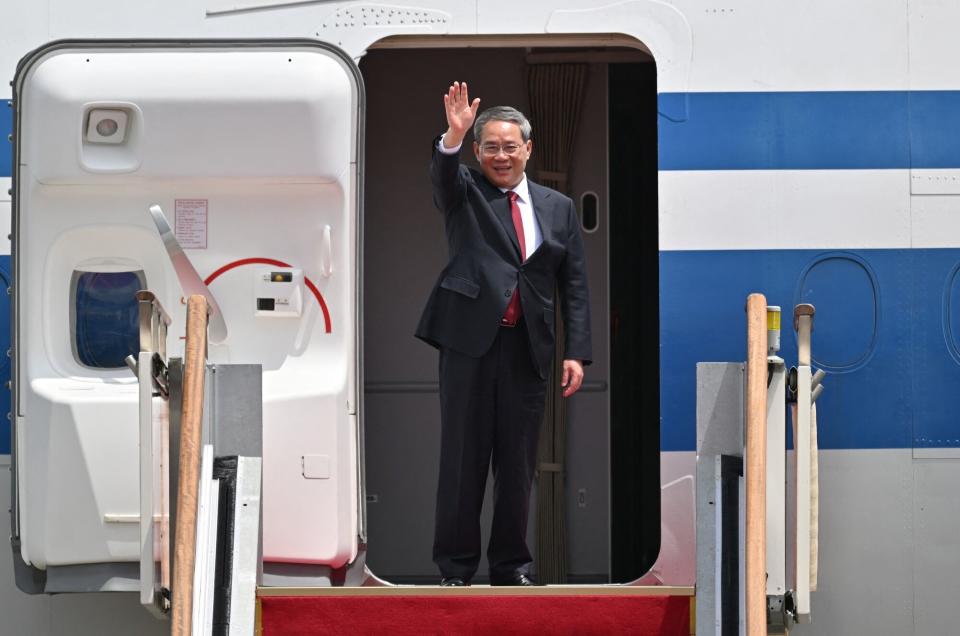China to Send Premier to Australia for First Time Since 2017

(Bloomberg) -- Premier Li Qiang will become the most senior Chinese leader to visit Australia in seven years when he touches down on Saturday, a diplomatic milestone that may be overshadowed by renewed frictions over investment and military deployments.
Most Read from Bloomberg
Apple Hits Record After Unveiling ‘AI for the Rest of Us’ Plan
NYC Landlord to Sell Office Building at Roughly 67% Discount
Russia Is Sending Young Africans to Die in Its War Against Ukraine
Li will travel to Adelaide, Canberra and Perth in a four-day tour, the Australian government said in a statement on Tuesday. He will be the first senior Chinese leader to visit Australia since his predecessor Li Keqiang last toured in March 2017.
“Welcoming the Chinese Premier to Australia is an opportunity for us to advance our interests by demonstrating our national values, our people’s qualities and our economy’s strengths,” Prime Minister Anthony Albanese said at a press conference in Canberra announcing the visit.
China’s Ministry of Foreign Affairs spokesperson Lin Jian confirmed Li’s trip on Tuesday, saying the two countries had a “promising future for cooperation.”
“China stands ready to work with Australia through this visit to strengthen high level exchanges, enhance mutual understanding and trust, deepen practical cooperation and jointly build a more mature, stable and fruitful comprehensive strategic partnership between China and Australia,” Lin told reporters in Beijing.
While Li’s exact schedule is still unknown, Albanese said he would be part of a CEO roundtable of business leaders from both Australia and China, as well as a guest at a state lunch held in the Australian Parliament.
The trip by China’s No. 2 official after President Xi Jinping will be welcomed as the latest sign of warming diplomatic ties between Beijing and Canberra. A steady improvement has been in train since the election of a center-left Labor government in May 2022.
Over the past 12 months, China has lifted trade curbs on Australian imports including wine, barley, beef and timber. These were imposed during the Covid-19 pandemic following calls by then-Prime Minister Scott Morrison for an independent investigation into the origins of the virus.
Two Australian beef meatworks still face restrictions on exports to China, as do lobsters.
However, Li’s trip comes at a time when the outlook for the diplomatic warming appears increasingly clouded. Beijing has been pushing for even closer ties with Canberra, while Albanese’s government has only emphasized the need for “stabilization.”
In recent years, Australia has deepened its diplomatic and security ties with the US, including through the Aukus security pact to deliver Canberra a fleet of nuclear-powered submarines by the 2030s. The Biden administration has also been pushing greater cooperation between Australia and the US to beef up critical mineral supply chains.
Beijing too has been pushing for greater access to the vital industry but with little success. Earlier this month, Treasurer Jim Chalmers ordered a China-linked investor to divest its stake in a rare earths miner.
“Foreign investment has a role to play in Australia, we do it on a case by case basis considering the national interest,” Albanese said when asked about Chinese investment in critical minerals on Tuesday.
Multiple confrontations between the two countries’ militaries have also heightened tensions between Canberra and Beijing. A recent public opinion poll found Australians’ attitudes toward the Chinese government had barely improved since the end of the pandemic.
--With assistance from James Mayger.
(Updates with quote from PM Albanese)
Most Read from Bloomberg Businessweek
As Banking Moves Online, Branch Design Takes Cues From Starbucks
Food Companies Hope You Won’t Notice Shortages Are Raising Prices
Legacy Airlines Are Thriving With Ultracheap Fares, Crushing Budget Carriers
Sam Altman Was Bending the World to His Will Long Before OpenAI
©2024 Bloomberg L.P.

 Yahoo Finance
Yahoo Finance 